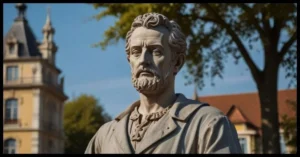Heinrich Servais, born in 1823 in the heart of Germany, grew up in a politically turbulent era. His childhood was heavily influenced by the social and political unrest in Europe during the 19th century. From a young age, Servais displayed a deep interest in understanding governance and societal structures, leading him to pursue higher education in political science and history.
Family Background and Roots
The Servais family had a rich history deeply rooted in German culture. Coming from a lineage of educators and community leaders, Heinrich’s upbringing was centered around a strong sense of duty and public service. His father, a local magistrate, instilled values of integrity and justice, which played a pivotal role in shaping Servais’ future endeavors.
Education and Formative Years
Educated at some of the most prestigious institutions in Germany, Heinrich Servais was a scholar of political philosophy and law. His years in academia honed his analytical skills, enabling him to critically engage with the socio-political issues of his time. This period of intellectual growth would later influence his political strategies and leadership style.

Political Landscape in Germany During Servais’ Time
The Germany that Servais entered as a young leader was vastly different from the unified nation it is today. During the 19th century, Germany was fragmented into various states, each with its own government and political agendas. The political climate was marked by movements for national unity, liberal reforms, and industrialization.
Key Historical Events Influencing His Era
Events such as the Revolutions of 1848 and the rise of nationalism across Europe were significant in shaping Servais’ political outlook. These movements ignited calls for greater representation and political change, and Heinrich Servais found himself at the forefront of these discussions, advocating for a unified German state.
Servais’ Role in Shaping Germany’s Political Climate
Servais quickly became known for his pragmatic approach to politics. He advocated for gradual reforms rather than radical upheavals, believing that sustainable change could only come through a combination of diplomacy, consensus, and calculated policy-making. His vision was to create a cohesive German nation without sacrificing its regional identities.
Heinrich Servais’ Contribution to German Politics
One of Heinrich Servais Germany most significant contributions was his role in the early efforts towards German unification. He was a strong proponent of national identity and saw the importance of unifying the various German states under a single, strong government.
Key Policies and Political Philosophy
Servais was known for his forward-thinking policies that aimed at economic modernization, educational reforms, and social welfare. His belief in a strong centralized state was balanced by his commitment to ensuring that individual freedoms and regional governance structures were respected.
Impact on German Nationalism and Unity
Servais’ policies played a significant role in the formation of a unified German identity. His influence on German nationalism, though measured, was pivotal in laying the groundwork for the eventual unification of Germany under Prussian leadership in 1871.
Servais’ Leadership Style
Known for his diplomatic skills, Heinrich Servais managed to navigate the complex political landscape of 19th-century Germany with grace. He built alliances across regional divides and was respected for his ability to maintain political stability even in times of social upheaval.
Diplomatic Approaches and Alliances
Servais’ foreign policy was marked by his efforts to build strong alliances with neighboring states while maintaining Germany’s sovereignty. His diplomacy was instrumental in keeping Germany at peace during a time when much of Europe was embroiled in conflicts.
Public Perception and Legacy
Though not without his critics, Heinrich Servais was widely admired for his leadership. His legacy in Germany is remembered for his dedication to public service and his efforts in laying the foundation for modern German governance.
Challenges Faced by Heinrich Servais
Despite his accomplishments, Heinrich Servais faced significant opposition from various political factions. His moderate stance often put him at odds with both radical reformers and conservative traditionalists, making his political journey a challenging one.
Opposition and Political Rivals
Political opposition was a constant in Servais’ career, with many leaders viewing his policies as either too progressive or not progressive enough. He often found himself in heated debates with political figures who wanted more immediate and radical changes.
Personal Struggles and Overcoming Obstacles
Servais’ personal life was marked by the constant struggle to balance his public duties with his family responsibilities. Despite these challenges, he remained committed to his political vision, overcoming personal and professional obstacles with resilience.
Heinrich Servais’ Relationship with Other German Leaders
Throughout his career, Heinrich Servais collaborated with numerous prominent leaders in Germany. His relationships with figures such as Otto von Bismarck were both collaborative and competitive, shaping the political future of the nation.
Collaborations and Conflicts
While Servais worked alongside many of Germany’s influential leaders, there were times of conflict, particularly with those who did not share his vision of gradual reform. However, these conflicts often led to a deeper understanding and mutual respect between leaders.






Leave a Reply